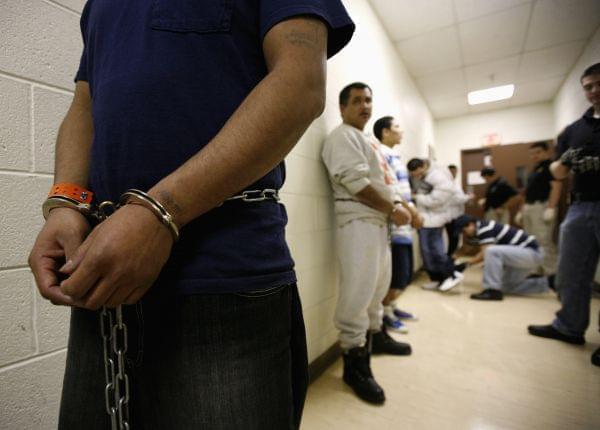Immigrant Detention Center In Dwight?; Walgreens; Harold Washington’s Legacy; Progressive Income Tax

Deportees wait to be transferred at the Immigration and Customs Enforcement's in Broadview, Ill. facility on March 14, 2008. For years, the town of Dwight, Ill depended on a federal prison that is now closed. Now, that facility may be home to an immigration detention center. Brian Kersey/AP
On the 21st: For years, Dwight depended on a federal prison that is now closed. Now, community leaders believe they may have found a solution in the form of another kind of facility: an immigration detention center. Plus, the FDA says one in five Walgreens stores that were inspected illegally sold tobacco products to minors. Some lawmakers are also saying it’s time for the company to stop selling tobacco altogether. Also, it’s been more than 30 years since Harold Washington became Chicago’s first African-American mayor. We'll examine his legacy and how black politics has changed since. And, we'll unpack Gov. Pritzker's new tax rates that he's released that would be part of a new, statewide progressive income tax.
The town of Dwight is not unlike many small towns in Illinois. The town, in between Bloomington and Joliet, for years depended on one major employer for the most of the jobs for its 4000 residents.
And then that employer left. The jobs in Dwight were coming from a prison which is now closed. The village lost about 450 jobs and $50 million in annual economic impact.
Community leaders believe they may have found a solution in the form of another kind of facility: An immigration detention center. Specifically a $20 million federal detention center for undocumented immigrants. Not everyone in the community supports this decision, and the village board will be voting on whether or not to approve the land for this use at a meeting this evening in Dwight.
Joining us for more on this we had WGLT reporter Eric Stock, who has been covering this for our partner station. Also on the line from Macomb we had Christopher Merrett from Western Illinois University’s Institute of Rural Affairs.
Sonny Garcia also joined us. He's a Bloomington-Normal resident who started the No ICE Dwight Facebook campaign and has been working to mobilize members to attend Dwight village board meetings on this issue.
After Dwight lost its correctional facility, 450 jobs and $50 million in annual economic impact went with it. Village President Jared Anderson hopes that this potential ICE facility would bring in almost 300 jobs.
— The 21st (@21stShow) March 11, 2019
More from @EricWGLT: https://t.co/wd1NKQz06M
Plus --
If you looked for Illinois companies on the Fortune 500 list, you’d see that the most valuable one is Walgreens. The Deerfield-based company made $131.5 billion dollars in sales last fiscal year.
It’s also at the top of another list, one that has made the company the target of both lawmakers and federal agencies. Last month, the FDA said publicly that Walgreens was the number one pharmacy culprit when it comes to selling tobacco to minors. Commissioner Scott Gottlieb said that since 2010, nearly one in five inspected Walgreens stores have done this.
Five Democratic senators including Dick Durbin have also written to Walgreens calling on the company to stop selling tobacco products altogether.
For more on this, we were joined by Lisa Schencker. She’s a health care business reporter with the Chicago Tribune.
But, despite this Walgreens is also marketing to Cancer patients with a new campaignhttps://t.co/Jc1VR3eEkP
— The 21st (@21stShow) March 11, 2019
And --
It’s been more than three decades since Harold Washington made history by becoming Chicago’s first African-American mayor. During his time in office, Washington became known for breaking the Democratic machine, advocating for civil rights, and successfully harnessing black and brown political power in the city.
And it’s an example the black community in Chicago has turned to time and again when trying to emulate that success. But it’s been a long time since Harold Washington was mayor, and as Chicago selects its next African-American leader, is it time to give up the ghost of Harold Washington?
Natalie Moore reported on this for WBEZ. Natalie spoke with us on the line from Chicago.
Also --
Throughout his campaign, Governor JB Pritzker has said he wants to change our state’s income tax system. Today, all of us pay 4.95 percent, no matter how much or little we make. The governor says we need to change that and have higher earners pay more.
Late last week, we finally got the details of Pritzker’s new income tax plan for Illinois.
This tax plan does ask people who are wealthier to pay more, but not unreasonably so. And it does give a tax break to 97 percent of people across the state of Illinois.
For more on this we were joined by Brian Mackey, statehouse reporter for Illinois Public Radio. Peter Hancock also spoke with us. He’s the statehouse reporter for Capitol News Illinois.
"You've already seen the campaign wars beginning...one of the big questions will be - how much capital does the IL legislature have with the public?"
— The 21st (@21stShow) March 11, 2019
- @PeterQHancock @CapitolNewsIL

